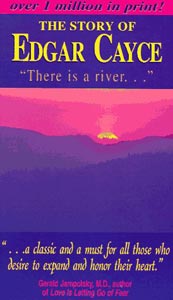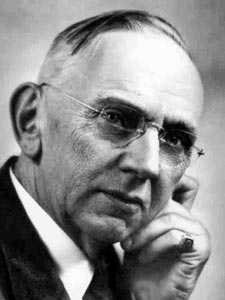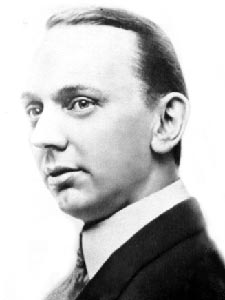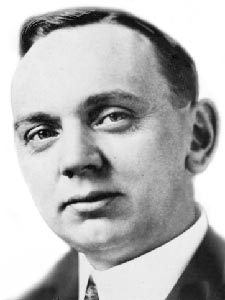Story of Edgar Cayce: There Is a River by Thomas Sugrue
Thomas Sugrue: There is a River

There is a River
There is a River: The Story of Edgar Cayce. By Thomas Sugrue
I should begin with something of a disclaimer: this is more than just a book review—it is backstory to myself as well, for Thomas Sugrue's There is a River holds a very special place in my life. While I can trace my awakening to spirituality after the fact to a wide variety of preparatory life events and circumstances, it was this account of life story of Edgar Cayce that introduced me to meditation, the soul's journey and God-realisation. I now practise the first, am continuing the second, and, come hell or high-water, rather keen to reach the third.
I had been meaning to learn about Edgar Cayce for many years before reading this book. I first came across his name at age 12, in a book about the lost continent of Atlantis, a particularly strong childhood fascination of mine. He was mentioned only in passing, quoted as giving the approximate date for the sinking of Atlantis—circa 10,000 B.C. "How on earth could he know that?" I thought. I asked my mother about him and got an elliptical answer—"I'll tell you about him when you're older". Red rag to a bull in my particular case, but the next trip to the city library turned up only a single book which always happened to be out. In these pre-internet times the subject slowly slipped my mind.
Edgar Cayce returned from memory to full attention several years later when reading, of all things, a Stephen King novel. Yes, art-critics, I can be decidedly low-brow at times. The Dead Zone —probably King's best—tells the compelling story of a man who, awakening from a coma, can see the future, and is faced with the moral dilemma of whether to act to avoid a calamity he is certain will come to pass. In the course of the story a reference is made to a real life seer—Edgar Cayce, whose life story, as I would soon discover, is even more fantastic than a work of fiction.
While I clearly remember my first encounters with the man whose life-story would prove to be so personally inspiring, strangely enough I don't recall a precise event that lead me to finally investigate this person dwelling at the back of my mind. Like many God-seekers, there comes a point in our lives when nothing seems to be working, when all the doors ahead of us seem closed, and then serendipity appears, leading us towards a path unseen, guided by fate's invisible hand.
My discovery of the story of Edgar Cayce came at a time in my life of profound emptiness and angst. Not that my individual circumstances were particularly special or unusual, and yes thousands of teen aged poems are written and mostly never read on this topic, but maybe that was the problem—I was firmly convinced that life should be special and unusual, in a manner I couldn't articulate or mirror outwardly, yet nothing I could find or try reflected adequately my unspoken highest idealism.

Edgar Cayce—the "Sleeping Prophet"
I had not long finished high school, a time of my life best forgotten, and best summarised as an extended sentence in a place where you learn much about what you are not—a most unsatisfying partial answer to the only question that brings true satisfaction: "Who I am?" Now studying in my first year of University, more by default than any special aspiration, and no more inspired about my life's direction or opportunities than the year before, I was taking subjects which I had no interest in, but perhaps less no-interest than others, mostly because I couldn't think of anything better to do.
At some point, between living in a student flat straight out of Haight-Ashbury, working a cleaning job at nights and on the brink of failing my entire first semester (Philosophy, Psychology and German—what was I thinking?) something reminded me to check the city library, many years since previously, for a book on Edgar Cayce. Although not even close to completing the hours of course-assigned background reading assigned daily, even in part it wasn't interesting me—perhaps here was something that finally might?
Might? Did and then some! Within several weeks I had probably read half a dozen of the many books on and related to the man known as "The Father of the New Age" and "America's Greatest Prophet", by year's end many dozen more.
"There is a River", the life story of Edgar Cayce, was the first book I read, and the spark that lit an all-consuming hunger for spirituality. I was practising self-taught meditation within a week, the result of reading a particularly resonant, life's purpose answering passage: "What is the purpose of life? To realise God. How does one know God? Through meditation." With that I was off, my life consumed with a clear direction and meaning I had always known existed, but couldn't articulate.
High praise indeed, but what of the book itself. There is a River was the very first book to be written about Edgar Cayce, and it's release in 1943 catapulted him to a national fame and attention which he had never sought, attention which in part contributed to his death two years later from sheer exhaustion—he worked himself to death attempting to selflessly meet the nearly bottomless demand for his very special abilities.
The story begins with a highly religious youth of humble origins, normal in most respects aside from the fact, kept mostly to himself, that he held an ongoing conversation with his still visible dead grandfather, could see auras, and after sleeping on his schoolbooks could recite every word. Oh, and as a child he had "little playmates" who disappeared when others came around. He once enquired where they came from—"We are of the music, the light and the flowers..."
As a young boy, Edgar attended church devotedly, and his most cherished ambition was to be a minister. He resolved to read the Bible through once for each year of his life, and at age 13, working his way through his thirteenth reading, his attention was caught by a strange sound:
"...there was a sudden humming sound out side and bright light filled the little place where Eddy sat, and a figure all in white bright as the noon day light, and the figure spoke—saying your prayers have been heard. what would you ask of me, that I may give it to you,—just that I may be helpful to others, especially to children who are ill, and that I may love my fellow man, and the figure was gone."

A young Edgar Cayce
His wish would eventually be answered, but in a most unusual way, and as one highly religious he would question long and hard whether what became his life work—the giving of psychic readings in a "deep sleep" or trance state—was from God or the Devil.
The day following the vision there occurred the "spelling-book incident." Cayce, who, aside from matters concerning the Bible was never much of a student, found himself, in light of the events of the day before, hopelessly distracted from a spelling lesson:
"In school next day Eddy missed his lessons as usual—and had to remain to write the word cabin 500 times on blackboard, and when he arrived at home that evening his Father was waiting for him—Eddy studied his lessons in the evening but seemed not to be able to concentrate, and at about 11 that evening he had the first experience of hearing the voice with-in—and it recalled the voice of the visitor of the evening before-but it said "Sleep and we may help you." Eddy asked his Father to let him sleep five minutes, he slept and at the end of the time Eddy knew every word in that particular speller."
Edgar Cayce himself recalls,
"Not only was I able to spell all the words in the lesson, but any word in that particular book; not only spell them, but tell on what page and what line each word could be found, and how it was marked ... they appeared before my eyes as recited."
Cayce soon found that he could do the same thing with any book. For his eighth-grade graduation ceremony he showed off his ability by reciting an hour-and-a-half-long speech that their visiting congressman, James "Quinnine Jim" MacKenzie, had given against the quinnine tariff.
However it wasn't until a severe case of laryngitis many years later that the greater extent of Edgar Cayce's unusual capacities began to emerge. Reduced to speaking in barely a whisper for nearly a year and unresponsive to treatment, he agreed as a last resort to experiment with a hypnotist. To the amazement of all, once hypnotised Cayce could speak normally, but lost his voice again upon awakening. Back under hypnosis, he was asked if he could talk about what was causing the condition. Speaking very clearly and knowledgeably about the condition and what was needed to cure it, he recommended a treatment, the application of which proved to be successful.
This was the very first of what grew to be thousands—approximately 22,000 in total—of "readings", all performed free of charge other than donation, which would bring Edgar Cayce world wide attention as "The Sleeping Prophet". Beginning with medical diagnoses ("health readings"), usually working from no more than a written description of the ailment, the name of the person and their location—the subject themselves was almost never present—Cayce would put himself to sleep and then be able to answer literally any question given to him, with the exception of questions given for financial gain or spiritually improper motivations. Over a lifetime of giving at least two reading a day, Cayce branched out into discourses on the individual soul's journey ("life-readings" detailing an individual's past incarnations, personality, talents and karma), predictions of the future, and the origin and spiritual destiny of man and his relationship with God. The topics and answers given were only limited to the intention, imagination and need of the person asking them.
A parade of would-be debunkers—doctors, scholars and celebrities including Houdini, plus thousands of patients—poured out astonished, grateful testimonials to Cayce's veracity. Named in the New York Times as "the most fascinating man in America‚" he was consulted by Thomas Edison, George Gershwin, Woodrow Wilson and Harry Truman, and highlights of his trance-state readings include series on the destruction of Atlantis, ancient Egypt, the construction of the Pyramids and Jesus, mentioning his time in India and elucidating details later borne out by the discovery of the Dead Sea Scrolls.
In the course of his readings Cayce gave meticulously detailed cures to a host of medical conditions, and often described methods of treatment yet to be invented. His trance-state discourses are the origin of colour-theraphy, music-therapy, the application of electrical currents and a host of other treatments marginal even today, and he is considered to be the father of the concept of "Holism"—the principal that the all of the conditions that contribute to physical and mental health must be taken into account to achieve wellness.

Edgar Cayce
While I myself was at first very much enamoured by the fantastic, miraculous nature of the Edgar Cayce life story, along with the rather heady intellectual concept that inner truth can transcend the limitations of physicality, space and time, in the many years of my own subsequent spiritual practise as a student of Sri Chinmoy I have come to reinterpret his life story as a personally inspiring account of a man of deep faith and conviction, who first and foremost attempted to live the truths that he himself spoke.
In any discussion of Edgar Cayce it should be remembered that he was unable to recall anything he said whilst in trance, and thus was as much a student of his own sleeping self as anyone else. His own trance source stated the reason for this apparent limitation—in a previous incarnation he had the same capacity, but would make more spiritual progress this time around using it unconsciously.
He struggled with his gift for many years, not just the burden of bearing an unusual capacity, and all the unwanted attention and notoriety it brought, but also in coming to terms with concepts often in complete contradiction to his waking Christian faith—reincarnation, karma, astrology and psychic abilities, then and now an anathema to many in Christianity.
Refusing to accept any money other than voluntary donations—he considered his ability to be a gift from God for the service of all humanity—he made barely enough to support himself and his family through what was considered to be a highly dubious occupation, and was thrown into jail once for fortune telling. He did nothing in his life without putting it first to prayer and meditation, and was often rebuked by the keen tongue of own his sleeping self, in New Testament fashion quick to point short-coming in intention or deed of those that sought its counsel.
I can't talk about the life of Edgar Cayce without relating at least one juicy story. The following is his own account of a dream in which he appears to have been given a glimpse of his next incarnation. Make of it what you will...
"I had been born again in 2100 A.D. in Nebraska. The sea apparently covered all of the western part of the country, as the city where I lived was on the coast. The family name was a strange one. At an early age as a child I declared myself to be Edgar Cayce who had lived 200 years before. Scientists, men with long beads, little hair, and thick glasses, were called in to observe me. They decided to visit the places where I said I had been born, lived, and worked in Kentucky, Alabama, New York, Michigan, and Virginia."Taking me with them the group of scientists visited these places in a long, cigar-shaped metal flying ship which moved at a high speed."Water covered part of Alabama. Norfolk, Virginia, had become an immense seaport. New York had been destroyed either by war or an immense earthquake and was being rebuilt. Industries were scattered over the countryside. Most of the houses were built of glass. Many records of my work as Edgar Cayce were discovered and collected."The group returned to Nebraska, taking the records with them to study... These changes in the earth will come to pass, for the time and times and half times are at an end, and there begins those periods for the readjustments..."
Related links:
- edgarcayce.org: Official website of the A.R.E. (Association for Research and Enlightenment), the organisation established to preserve, study and promote the Cayce readings
- "Edgar Cayce: An American Prophet" by Sidney D. Kirkpatrick: salon.com book review and good overview of the man and his life
- The Edgar Cayce Story: A very 80s video overview of Edgar Cayce's life story
- http://jaitra.srichinmoycentre.org/writings/prose/there-is-a-river






Δεν υπάρχουν σχόλια:
Δημοσίευση σχολίου